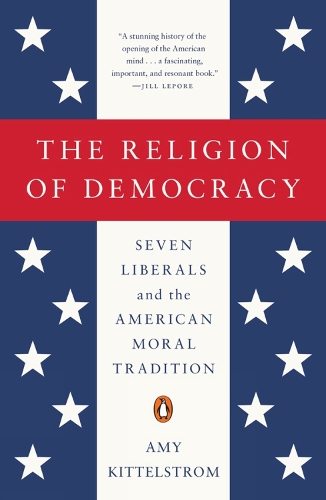
The Religion of Democracy: Seven Liberals and the American Moral Tradition
(Paperback)
Publishing Details
The Religion of Democracy: Seven Liberals and the American Moral Tradition
By (Author) Amy Kittelstrom
Penguin Putnam Inc
Penguin USA
15th January 2017
United States
Classifications
General
Non Fiction
History: theory and methods
Political ideologies and movements
261.7
Physical Properties
Paperback
464
Width 140mm, Height 214mm
417g
Description
Today we associate liberal thought and politics with secularism. But the role of religion in American politics has always been far more complex than today's debates would suggest. American democracy was intended to be more than just a political system, and in The Religion of Democracy, historian Amy Kittelstrom shows how religion and democracy have worked together as universal ideals in American culture. Sweeping and ambitious, it is a lively narrative of quintessentially American ideas as they were forged, debated, and remade across our history.
Reviews
Christian Century:
The Religion of Democracyis an extremely well-researched and interesting description of the sustaining arguments and tenets of the American Reformation, as well as an informative portrayal of the complex lives of some of its central figures.
TheSan Francisco Chronicle:
Historian Kittelstrom brilliantly presents the historic relationship between Christianity and social progress in American history.
Publishers Weekly(starred review):
Kittelstroms history stands out for its deeply textured treatment of each of these profoundly important thinkers, permitting appreciation of the influences that brought them to an enlightened view of faith and its sociopolitical implications. This timely, important work by an excellent scholar is part of the Penguin History of American Life series.
Booklist:
Historian Kittelstrom examines the lives and the writings of seven prominent American liberals and suggests that todays pluralistic political liberalism is a direct descendant of the religious liberalism that emerged in, and transformed, the eighteenth and nineteenth centuries The result is a lively and erudite reminder of pluralisms deep roots in American soil, and religions role in putting them there.
Library Journal (starred review):
Kittelstrom explores the private and intellectual lives of each individual and provides new insights into the cultural history of liberalism Readers will appreciate the skillful weaving of primary sources into a compelling chronicle of an idea told through individual experiences.
CHOICE Magazine:
"This book challenges contemporary conversations that conflate secularism and liberalism and expands the scholarly understanding of liberalism in the US. Highly recommended."
Jill Lepore, author ofBook of AgesandThe Secret History of Wonder Woman:
The Religion of Democracy is a stunning history of the opening of the American mind. Through a shrewd study of seven subtle thinkers, Kittelstrom explores the place of belief, faith, and virtue in the intellectual traditions that lie behind American liberalism. A fascinating, important, and resonant book.
Daniel Walker Howe, Pulitzer Prize-winning author ofWhat Hath God Wrought: The Transformation of America, 1815-1848:
Amy Kittelstrom here pours new life into intellectual history for scholars and concerned citizens, whether they are religious or not. She traces the commitments of present-day civic liberalismfree inquiry, cultural pluralism, public education, and compassion for the disadvantagednot to the rise of secularism but to the Christian theological liberalism of New England at the time of the American Revolution. She finds these origins in what she terms, appropriately, an American Reformation.
David D. Hall, Harvard University; author ofA Reforming People:
Turning the pages of this remarkable book, I found myself moved not only by its intellectual range and the lucidity of Kittelstroms prose but also by its central theme, the emergence in nineteenth-century America of an ethical commitment to democracys highest moral and practical possibilitiesin effect, a religion of democracy. An illuminating story, for our times as well as for what it tells us about the past.
Author Bio
Amy Kittelstrom is a scholar of modern thought and culture who lives and works in the North Bay Area of California. She currently serves on the editorial board of the Journal of American History and is an associate professor at Sonoma State University. Her research has been supported by fellowships from the Center for Religion and American Life at Yale, the Charles Warren Center for the Study of American History at Harvard, and the Center for the Study of Religion at Princeton. Her next book will put the twentieth-century writer James Baldwin in deep historical context.
